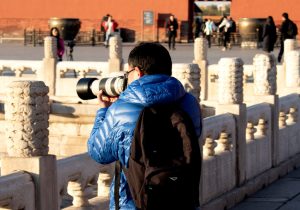London – Listed as the country with the highest number of journalists incarcerated in the world by press freedom advocacy organizations, China has earned its reputation with attacks and at least two arrests since protests against the government intensified in recent days.
The case that had the biggest international repercussions was the case of journalist Edward Laurence of the British public broadcaster BBC. He was thrown to the ground, beaten, and detained for several hours. The same thing happened to Michael Peuker of Radio Television Suisse.
This Monday (28), the China Foreign Correspondents Club (FCCC) said it was “extremely appalled” by the treatment of journalists covering the recent protests in Shanghai and Beijing.
The right to report on protests in China
Demonstrations have erupted in Chinese cities since November 25 in response to the government’s strict policies to control Covid-19, which firefighters accused of interfering with efforts to rescue victims of a fire in a residential building in the city of Urumqi.
The organization’s statement reminds that, according to Chinese law, foreign journalists have unlimited access to news in China. “In these cases, they will report the streets of the cities they live in,” said Varlık.
We urge the authorities to keep their word and protect the safety and right to information of all foreign journalists working in the country.”
China ranks 175th in Reporters Without Borders’ list of 180 countries for press freedom. According to the organization, there are currently 99 media workers detained in the country.
Videos of the attack on veteran BBC reporter and cameraman Ed Laurence were shared on social media and the event was covered in newspapers in many countries.
In one, Lawrence is on the ground, surrounded by police officers trying to drag and handcuff him. Participants in the protest watched, and some filmed the scene.
In another, he is taken away by agents and shouts to ask them to notify the British consulate.
This indicates that the journalist was arrested by the Shanghai police when he told his friend, “Call the consulate immediately”. pic.twitter.com/1PAeOFNTyx
— Shanghaishanghai (@Shanghaishang10) 27 November 2022
The incident escalates tensions between the BBC and the Chinese government. Last February, the Foreign Correspondents Club released a report documenting harassment against foreign journalists that has driven at least six professionals to leave the country.
One of them was award-winning BBC reporter John Sudworth, who left his post in Beijing in March 2021 under threat. He said he had to leave hastily with his children, then plainclothes police went to the airport.
Following the arrest of Ed Laurence, the station released a memo in which he protested the professional treatment and claimed he was attacked despite working with his credentials.
The note says there has been no official statement or apology from Chinese officials. He also criticizes the statement of the agents who arrested the journalist, describing the action as “an attempt to protect him from Covid in the middle of the crowd”.
BBC Statement on Ed Lawrence pic.twitter.com/wedDetCtpF
— BBC News Press Team (@BBCNewsPR) 27 November 2022
The Committee to Protect Journalists said on Monday, “Chinese authorities must immediately stop harassing and detain journalists and ensure the safety of reporters following the country’s protests against COVID-19 restrictions.
CPJ also opposed the arrest of Michael Peuker, the China correspondent for Swiss public broadcaster Radio Télévision Suisse’s RTS Info news platform.
The journalist told the Committee that after he finished the live broadcast from a protest site in Shanghai, police detained him and the camera operator, took them to the RTS Info office and confiscated their video equipment.
Peuker told CPJ that officers received a call from their “boss” ordering their release and then returning their equipment.
“The arrests of BBC reporter Edward Lawrence and RTS Info reporter Michael Peuker are the latest examples of Chinese authorities’ unforgivable efforts to suppress the work of the press,” said CPJ China representative Iris Hsu.
“Chinese authorities must ensure that members of the press can report freely and stop harassing and attacking reporters covering the protests.”
Covid is a pretext for pressure on journalists in China
The rationale for Ed Lawrence’s arrest during the protests by police agents is in line with the practice of using covid-19 to suppress freedom of the press, as noted in the report. “Confined or Expelled: Covering China”, which he produced Foreign Correspondents Club.
According to the document, the epidemic was used as an excuse to deny visas, prevent journalists from entering certain places, ban correspondent trips and cancel interviews.
The report reported that 52% of respondents were told to leave a place or denied access for health and safety reasons, even if there was no risk involved.
Jonathan Cheng of the Wall Street Journal stated that the way the government is handling Covid-19 has caused the newspaper to change its reporting plans:
“We canceled several planned trips because we were confident that the restrictions attributed to Covid would block our access.”
Reporters Without Borders, in its analysis of China in the Global Press Freedom Index 2022, found that President Xi Jinping, who has been in power since 2013, “restores a media culture befitting the Maoist era, when free access to information was a crime and providing information was a crime. states. an even greater crime.”
The organization noted that China’s state and private media are increasingly tightly controlled by the Communist Party, and the administration is creating more and more barriers to foreign correspondents.
Also read | “Shut Down or Deported”: New Report Highlights China’s Abuses Against Foreign Correspondents
source: Noticias
Mark Jones is a world traveler and journalist for News Rebeat. With a curious mind and a love of adventure, Mark brings a unique perspective to the latest global events and provides in-depth and thought-provoking coverage of the world at large.
